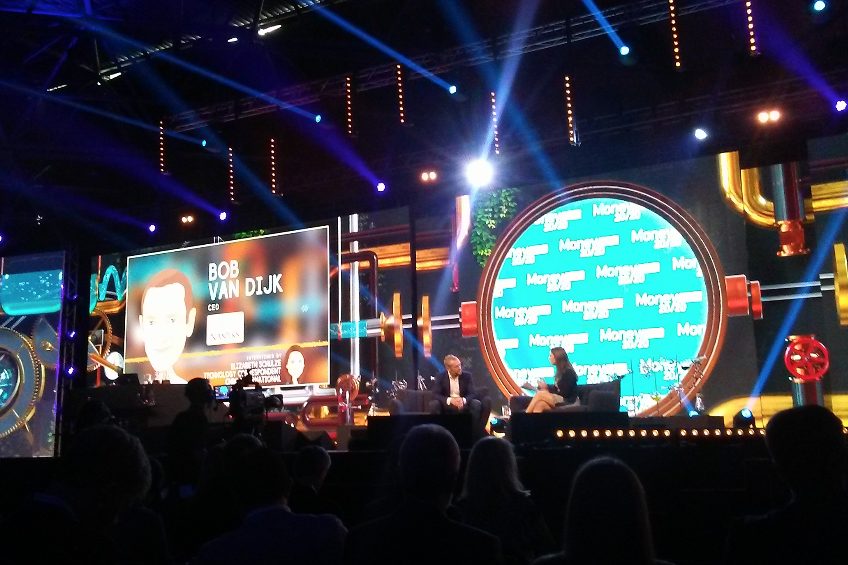By Matthew Dove
Much like the miasmic expulsion of gas that bears his name, the Fintech Times beat a hasty retreat from President Donald J Trump yesterday morning. Just as the leader of the free world touched down in Stansted – to be met, grim faced, by Queen Elizabeth II – the guardians of TFT Towers headed to Money 20/20 Amsterdam. Their mission? To wait out perhaps the least stately state visit in living memory. Oh, and to learn about payments and whatnot.
As the second-generation immigrant, formerly known as Drumpf, faced an inevitable salvo of milkshakes back in Blighty, what was everyone at the world’s shiniest fintech conference talking about? Err, Donald Trump as it turned out…
With the POTUS firmly in mind, the highlight of day one was surely the introduction of Naspers CEO Bob van Dijk to the strains of Ol’ Dirty Bastard’s Got Your Money. Considering much of van Dijk’s conversation with CNBC’s Elizabeth Schulze involved thinly veiled references to the Donald’s numerous trade wars, the track could hardly have been more fitting! Coupled with the fact that a song so sleazy would be played unironically to a room full of bankers left this hack in pressing need of a shower.
 Not that anyone here seems to rate Trump’s chances of winning any of the petulant pissing contests he so readily instigates.
Not that anyone here seems to rate Trump’s chances of winning any of the petulant pissing contests he so readily instigates.
Just after lunch, moderator Louisa Bojeson happily announced that the US lagged behind both China and India in a poll which asked delegates who they thought would lead future payments innovations.
Contempt for Il Douche continued on the main stage when Dr. Hermann Hauser was invited to join Ralph Simon for a fireside chat. Once the pulsing disco of Abba’s Money, Money, Money had subsided (where did they get this DJ?), Simon asked Hauser for his opinion of Trump’s stance on Huawei.
The Amadeus Capital partner didn’t pull any punches, spitting that the self-proclaimed “very stable genius” had behaved unacceptably with regards to the Chinese tech giant. Hauser argued that whatever security issues Huawei’s conduct may raise, America has no right to dictate the commercial behaviour of sovereign nations. Referring to ARM’s capitulation to Trump’s Huawei ban, Hauser opined that decisions affecting the British-Japanese microchip manufacturer should’ve been made, “in London or Tokyo not the White House.”
 Both here and in earlier talks the prevailing sense was one of foreboding. There exists real trepidation that a tech cold war could escalate between China and the States. It’s feared that a “Splinternet” (to use Schulze’s turn of phrase) may form, with each behemoth attempting to garner influence through investment in areas as diffuse as India, Western Europe and Southeast Asia. It would then essentially be left to the lesser tech nations to choose sides.
Both here and in earlier talks the prevailing sense was one of foreboding. There exists real trepidation that a tech cold war could escalate between China and the States. It’s feared that a “Splinternet” (to use Schulze’s turn of phrase) may form, with each behemoth attempting to garner influence through investment in areas as diffuse as India, Western Europe and Southeast Asia. It would then essentially be left to the lesser tech nations to choose sides.
Decision making also occupied the foreground when machine learning, blockchain tech and quantum computing were discussed. All three are likely to compliment each other in the advancement of risk management and complex portfolio optimisation. Neural networks and Gaussian processes (a powerful algorithm for the analysis and classification of huge data sets) will make automated decision making cheaper, faster and more reliable. If only they made Presidents like that…



